| Listing 1 - 10 of 11 | << page >> |
Sort by
|
Book
ISBN: 9780199603626 0199603626 0191746320 0191626112 1283986531 Year: 2012 Publisher: London Oxford University Press
Abstract | Keywords | Export | Availability | Bookmark
 Loading...
Loading...Choose an application
- Reference Manager
- EndNote
- RefWorks (Direct export to RefWorks)
Epic poetry, Greek --- Achilles (Greek mythology) in literature. --- Achilles (Greek mythology) --- Poésie épique grecque --- Achille (Mythologie grecque) dans la littérature --- Achille (Mythologie grecque) --- History and criticism --- Histoire et critique --- Homer. --- Homer --- Characters --- Achilles --- Achilles. --- Liefdesleven. --- Achilles (Greek mythology). --- Poésie épique grecque --- Achille (Mythologie grecque) dans la littérature --- In literature.
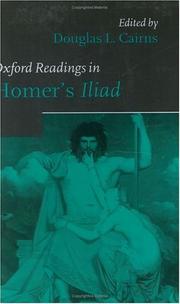
ISBN: 0198721838 019872182X 9780198721826 Year: 2001 Publisher: Oxford New York Oxford University Press
Abstract | Keywords | Export | Availability | Bookmark
 Loading...
Loading...Choose an application
- Reference Manager
- EndNote
- RefWorks (Direct export to RefWorks)
Epic poetry, Greek --- Achilles (Greek mythology) in literature. --- Trojan War --- Poésie épique grecque --- Achille (Mythologie grecque) dans la littérature --- Guerre de Troie --- History and criticism. --- Literature and the war. --- Histoire et critique --- Littérature et guerre --- Homer. --- Troy (Extinct city) --- Troie (Ville ancienne) dans la littérature --- In literature --- Achilles (Greek mythology) in literature --- History and criticism --- Literature and the war --- Poésie épique grecque --- Achille (Mythologie grecque) dans la littérature --- Littérature et guerre --- Troie (Ville ancienne) dans la littérature --- Achilles --- In literature. --- Epic poetry, Greek - History and criticism --- Trojan War - Literature and the war
Book
ISBN: 9782070765881 2070765881 Year: 2010 Publisher: Paris : Gallimard,
Abstract | Keywords | Export | Availability | Bookmark
 Loading...
Loading...Choose an application
- Reference Manager
- EndNote
- RefWorks (Direct export to RefWorks)
Le récit de la fabrication du bouclier d'Achille par Héphaistos au chant XVIII de l'Iliade est un texte mystérieux et fascinant. Le poète y présente le dieu forgeron créant de ses mains, pour figurer sur le bouclier, des hommes, des animaux, des végétaux et même des dieux, à la fois faits de métal et vivants, c'est-à-dire bougeant, agissant et parlant, dans des scènes de guerre et de paix, de vie urbaine et de vie agricole, le tout dans un cadre qui reproduit le cosmos tout entier. De l'Antiquité à nos jours, cet épisode de l'épopée n'a cessé de susciter l'ironie ou l'admiration et de faire naître débats et interrogations, si bien que le bouclier d'Achille apparaît comme l'une des inventions les plus fécondes de la littérature occidentale. Pour les théoriciens antiques et leurs successeurs, les vers consacrés au bouclier formaient l'un des piliers de l'ut pictura poesis et fournissaient le modèle à la fois originel et accompli de l'ekphrasis (ou description "vivante") d'une oeuvre d'art. Aux XVIIIe et XIXe siècles - Vasari faisant figure de pionnier - le passage a été utilisé comme document pour l'histoire des arts et comme preuve de la précocité des artistes grecs dans l'imitation parfaite de la réalité, celle qui donne l'illusion de la vie. En sens inverse, le bouclier a fait l'objet de diverses hypothèses de restitution où l'on voit la disposition des scènes et le style des figures évoluer avec la progressive redécouverte de l'art grec archaïque. Au XXe siècle, on a souvent vu dans l'épisode du bouclier un prétexte permettant au poète de délivrer à ses contemporains un message de sagesse et de pacifisme, fort utile aussi pour notre époque, tandis que certains critiques interprétaient sa fabrication comme une métaphore du chant poétique. Et si le bouclier d'Achille n'était ni une oeuvre d'art extraordinaire - la première qui serait apparue dans la littérature - ni une pure construction verbale? S'il s'agissait d'un dispositif de magie protectrice? Avec Héphaistos le dieu-sorcier, l'Iliade mettrait alors en scène les très anciennes accointances de l'art et de la magie.
Achilles (Greek mythology) --- Description (Rhetoric) --- Epic poetry, Greek --- Achilles (Greek mythology) in literature. --- Art and literature --- Trojan War --- Poetics --- Rhetoric, Ancient. --- Ekphrasis. --- Achille (Mythologie grecque) --- Discours descriptif --- Poésie épique grecque --- Achille (Mythologie grecque) dans la littérature --- Art et littérature --- Guerre de Troie --- Poétique --- Rhétorique ancienne --- Ekphrasis --- Art --- History --- History and criticism. --- Literature and the war. --- Histoire --- Histoire et critique --- Littérature et guerre --- Homer. --- Homer --- Technique. --- History of art --- Classical Greek art --- Mythology --- Poésie épique grecque --- Achille (Mythologie grecque) dans la littérature --- Art et littérature --- Poétique --- Rhétorique ancienne --- Littérature et guerre --- Achilles --- In literature. --- Achilles (Greek mythology) - Art --- Homer - Iliad
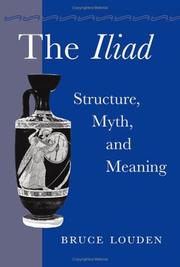
ISBN: 080188280X 9780801882807 0801889189 9780801889189 Year: 2006 Publisher: Baltimore Johns Hopkins university press
Abstract | Keywords | Export | Availability | Bookmark
 Loading...
Loading...Choose an application
- Reference Manager
- EndNote
- RefWorks (Direct export to RefWorks)
Louden's innovative method yields striking new insights into the formation and early literary contexts of Greek epic poetry.
Epic poetry, Greek --- Achilles (Greek mythology) in literature --- Trojan War --- Rhetoric, Ancient --- History and criticism --- Literature and the war --- Homer. --- Achilles (Greek mythology) in literature. --- Rhetoric, Ancient. --- History and criticism. --- Literature and the war. --- Achille (Mythologie grecque) dans la littérature --- Achilles (Griekse mythologie) in de literatuur --- Ancient rhetoric --- Antieke retoriek --- Retoriek [Antieke ] --- Retoriek van de Oudheid --- Rhetoric [Ancient ] --- Rhétorique ancienne --- Rhétorique de l'Antiquité --- Classical languages --- Greek language --- Greek rhetoric --- Latin language --- Latin rhetoric --- Rhetoric --- Epic poetry [Greek ] --- Homer --- Epic poetry, Greek - History and criticism --- Trojan War - Literature and the war --- Homer - Iliad --- Achilles (Mythological character) --- In literature. --- Achilles
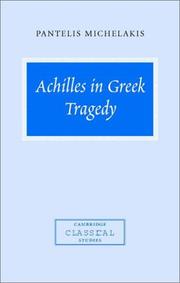
ISBN: 0521818435 9780521818438 Year: 2002 Volume: *51 Publisher: Cambridge Cambridge University press
Abstract | Keywords | Export | Availability | Bookmark
 Loading...
Loading...Choose an application
- Reference Manager
- EndNote
- RefWorks (Direct export to RefWorks)
Achille (Mythologie grecque) dans la littérature --- Achilles (Greek mythology) in literature --- Achilles (Griekse mythologie) in de literatuur --- Helden in de literatuur --- Heldendom in de literatuur --- Heldhaftigheid in de literatuur --- Heroes in literature --- Heroism in literature --- Héros dans la littérature --- Héroïsme dans la littérature --- Greek drama (Tragedy) --- Trojan War --- Tragédie grecque --- Guerre de Troie --- History and criticism --- Literature and the war --- Histoire et critique --- Littérature et guerre --- Achilles (Greek mythology) in literature. --- Heroes in literature. --- History and criticism. --- Literature and the war. --- -Heroes in literature --- -Mythology, Greek --- -History and criticism --- Tragédie grecque --- Achille (Mythologie grecque) dans la littérature --- Héros dans la littérature --- Littérature et guerre --- Achilles --- In literature --- Greek drama (Tragedy) - History and criticism. --- Trojan War - Literature and the war. --- Trojan War - Literature and the war
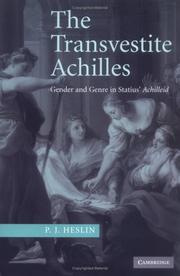
ISBN: 0521851459 9780521851459 9780511482236 9780521117753 051148223X 0511130430 9780511130434 0511128908 9780511128905 9780511300042 0511300042 1280416300 9781280416309 1107154189 0511182120 051119935X 0521117755 Year: 2005 Publisher: Cambridge Cambridge university press
Abstract | Keywords | Export | Availability | Bookmark
 Loading...
Loading...Choose an application
- Reference Manager
- EndNote
- RefWorks (Direct export to RefWorks)
Statius' Achilleid is a playful, witty, and open-ended epic in the manner of Ovid. As we follow Achilles' metamorphosis from wild boy to demure girl to lover to hero, the poet brilliantly illustrates a series of contrasting codes of behaviour: male and female, epic and elegiac. This first full-length study of the poem addresses not only the narrative itself, but also sets the myth of Achilles on Scyros within a broad interpretive framework. The exploration ranges from the reception of the Achilleid in Baroque opera to the anthropological parallels that have been adduced to explain Achilles' transvestism. The study's expansive approach, which includes Ovid and Ovidian reception, psychoanalytic perspectives and theorizations of gender in antiquity, makes it essential reading not only for students of Statius, but for students of Latin literature, and of gender in antiquity.
Achille (Mythologie grecque) dans la littérature --- Achilles (Greek mythology) in literature --- Achilles (Griekse mythologie) in de literatuur --- Transvestites in literature --- Travestieten in literatuur --- Travestis en littérature --- Achilles (Greek mythology) in literature. --- Transvestites in literature. --- Statius, P. Papinius --- Ovid, --- Influence. --- Nasó, P. Ovidi, --- Naso, Publius Ovidius, --- Nazon, --- Ouidio, --- Ovide, --- Ovidi, --- Ovidi Nasó, P., --- Ovidiĭ, --- Ovidiĭ Nazon, Publiĭ, --- Ovidio, --- Ovidio Nasón, P., --- Ovidio Nasone, Publio, --- Ovidios, --- Ovidiu, --- Ovidius Naso, P., --- Ovidius Naso, Publius, --- Owidiusz, --- P. Ovidius Naso, --- Publiĭ Ovidiĭ Nazon, --- Publio Ovidio Nasone, --- Ūvīd, --- אוביד, --- Statius, P. Papinius (Publius Papinius) --- Ovid --- Influence --- Cross-dressers in literature. --- Achilles --- In literature. --- Achìe --- Achilas --- Achille --- Achilleus --- Achilli --- Ahil --- Ahile --- Ahilej --- Ahillejs --- Aĥilo --- Aichill --- Akhilles --- Akhilleus --- Akhilleusz --- Akiles --- Akili --- Akille --- Akilles --- Akkilles --- Aquiles --- Aquilles --- Axill --- Axilles --- Ἀχιλλεύς --- آخيل --- アキレウス --- Akireusu --- 아킬레우스 --- 阿喀琉斯 --- Ахіл --- Ахил --- Ахилл --- Akhill --- Ахіллес --- אכילס --- Akhiles --- Arts and Humanities --- History
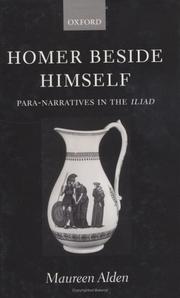
ISBN: 019815285X 9780198152859 Year: 2000 Publisher: Oxford : Oxford university press,
Abstract | Keywords | Export | Availability | Bookmark
 Loading...
Loading...Choose an application
- Reference Manager
- EndNote
- RefWorks (Direct export to RefWorks)
Students reading the Iliad for the first time are often bewildered by the sheer volume of information on apparently unrelated subjects contained in it. The central narrative seems to unfold very slowly, and to be complicated by long speeches containing stories which might be interesting in themselves, but which seem to have no relevance to anything else. In this book Dr Alden offers advice on how to read the Iliad through the relationship of major paradigms to the events of the main narrative. The first section offers the first full-length study in English of the paradigmatic functions of secondary narratives and minor-key episodes in the Iliad. None of these are irrelevant or merely ornamental: rather each is carefully selected and altered if necessary, to reflect on significant episodes of the main narrative and act as guides to its interpretation. The second section offers a general reading of the Iliad arising out of Phoenix's advice to Achilles in Book 9. The allegory of the Prayers illustrates the dire consequences of rejecting prayers, and the paradigm of Meleager presents us with an instance of an angry hero to whom prayers and entreaties are addressed, whilst the primary narrative confines this motif of prayers and entreaties in ascending scale of affection to Achilles and Hector and contrasts their responses. Both heroes suffer terribly for their rejection of entreaties.
Achilles (Greek mythology) in literature. --- Epic poetry, Greek --- Trojan War --- Storytelling in literature. --- Narration (Rhetoric). --- Rhetoric, Ancient. --- Achille (Mythologie grecque) dans la littérature --- Poésie épique grecque --- Guerre de Troie --- Art de conter dans la littérature --- Narration --- Rhétorique ancienne --- History and criticism. --- Literature and the war. --- Histoire et critique --- Littérature et guerre --- Homer. --- Homer --- Technique. --- Narration (Rhetoric) --- Achilles (Greek mythology) in literature --- Storytelling in literature --- History and criticism --- History --- Literature and the war --- Achille (Mythologie grecque) dans la littérature --- Poésie épique grecque --- Art de conter dans la littérature --- Rhétorique ancienne --- Littérature et guerre --- Achilles --- In literature. --- Epic poetry, Greek - History and criticism --- Narration (Rhetoric) - History - To 1500 --- Trojan War - Literature and the war --- Homer - Iliad
Book
ISBN: 0198140274 Year: 1992 Publisher: Oxford Clarendon
Abstract | Keywords | Export | Availability | Bookmark
 Loading...
Loading...Choose an application
- Reference Manager
- EndNote
- RefWorks (Direct export to RefWorks)
Achilles (Greek mythology) in literature --- Rhetoric, Ancient --- Trojan War --- Achille (Mythologie grecque) dans la littérature --- Rhétorique ancienne --- Guerre de Troie --- Literature and the war --- Littérature et guerre --- Homer --- Homer. --- Technique --- Epic poetry, Greek --- -Rhetoric, Ancient --- -Mythology, Greek --- Classical languages --- Greek language --- Greek rhetoric --- Latin language --- Latin rhetoric --- Greek epic poetry --- Epic poetry, Classical --- Greek poetry --- History and criticism --- Rhetoric --- -Technique --- -History and criticism --- -Hóiméar --- Hūmīrūs --- Homeros --- Homerus --- Gomer --- Omir --- Omer --- Omero --- Ho-ma --- Homa --- Homérosz --- האמער --- הומירוס --- הומר --- הומרוס --- هومر --- هوميروس --- 荷马 --- Ὅμηρος --- Гамэр --- Hamėr --- Омир --- Homero --- 호메로스 --- Homerosŭ --- Homērs --- Homeras --- Хомер --- ホメーロス --- ホメロス --- Гомер --- Homeri --- Hema --- Pseudo-Homer --- Pseudo Omero --- -Classical languages --- -Homer --- Homère --- Achille (Mythologie grecque) dans la littérature --- Rhétorique ancienne --- Littérature et guerre --- Rhetoric, Ancient. --- -Greek epic poetry --- Ancient rhetoric --- Technique. --- Achilles --- Hóiméar
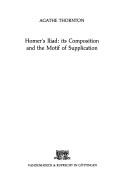
ISBN: 3525251793 Year: 1984 Volume: 81 Publisher: Göttingen Vandenhoeck und Ruprecht
Abstract | Keywords | Export | Availability | Bookmark
 Loading...
Loading...Choose an application
- Reference Manager
- EndNote
- RefWorks (Direct export to RefWorks)
Oral-formulaic analysis --- Trojan War --- Prayer in literature --- Oral tradition --- Achilles (Greek mythology) in literature --- Analyse des formules orales --- Guerre de Troie --- Prière dans la littérature --- Tradition orale --- Achille (Mythologie grecque) dans la littérature --- Literature and the war --- Littérature et guerre --- Homer. --- Homer --- Technique --- Troy (Extinct city) --- Troie (Ville ancienne) dans la littérature --- In literature --- Epic poetry, Greek --- -Oral tradition --- -Oral-formulaic analysis --- Rhetoric, Ancient --- -Mythology, Greek --- Classical languages --- Greek language --- Greek rhetoric --- Latin language --- Latin rhetoric --- Formulaic analysis, Oral --- Folk literature --- Folklore --- Tradition, Oral --- Oral communication --- Oral history --- Greek epic poetry --- Epic poetry, Classical --- Greek poetry --- History and criticism --- Rhetoric --- Methodology --- -Technique --- Achilles (Greek mythology) in literature. --- Oral-formulaic analysis. --- Prayer in literature. --- Rhetoric, Ancient. --- History and criticism. --- Literature and the war. --- Technique. --- -History and criticism --- -Hóiméar --- Hūmīrūs --- Homeros --- Homerus --- Gomer --- Omir --- Omer --- Omero --- Ho-ma --- Homa --- Homérosz --- האמער --- הומירוס --- הומר --- הומרוס --- هومر --- هوميروس --- 荷马 --- Ὅμηρος --- Гамэр --- Hamėr --- Омир --- Homero --- 호메로스 --- Homerosŭ --- Homērs --- Homeras --- Хомер --- ホメーロス --- ホメロス --- Гомер --- Homeri --- Hema --- Pseudo-Homer --- Pseudo Omero --- -Classical languages --- -Homer --- Homère --- Prière dans la littérature --- Achille (Mythologie grecque) dans la littérature --- Littérature et guerre --- Troie (Ville ancienne) dans la littérature --- -Formulaic analysis, Oral --- Ancient rhetoric --- Homère. Iliade. --- Homerus. Ilias. --- Achilles --- Hóiméar
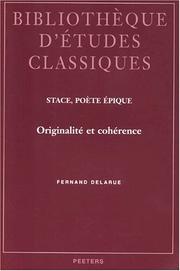
ISBN: 2877234940 9042908610 9789042908611 Year: 2000 Volume: 20 Publisher: Louvain Peeters
Abstract | Keywords | Export | Availability | Bookmark
 Loading...
Loading...Choose an application
- Reference Manager
- EndNote
- RefWorks (Direct export to RefWorks)
Latijnse letterkunde --- Littérature latine --- Stace --- Statius, Publius Papinius --- Epic poetry, Latin --- Seven against Thebes (Greek mythology) in literature. --- Achilles (Greek mythology) in literature. --- Poésie épique latine --- Sept contre Thèbes (Mythologie grecque) dans la littérature --- Achille (Mythologie grecque) dans la littérature --- History and criticism. --- Histoire et critique --- Statius, P. Papinius --- Criticism and interpretation. --- -Influence (Literary, artistic, etc.) --- Achilles (Greek mythology) in literature --- Seven against Thebes (Greek mythology) in literature --- Artistic impact --- Artistic influence --- Impact (Literary, artistic, etc.) --- Literary impact --- Literary influence --- Literary tradition --- Tradition (Literature) --- Art --- Influence (Psychology) --- Literature --- Intermediality --- Intertextuality --- Originality in literature --- Latin epic poetry --- Latin poetry --- History and criticism --- -Criticism and interpretation --- Eteocles (Greek mythology) --- Influence (Literary, artistic, etc.) --- Polyneices (Greek mythology) --- Sibling rivalry in literature. --- Thebes (Greece) --- In literature. --- -Publius Papinius Statius --- Statius, Papinius --- Criticism and interpretation --- Eteocles (Greek mythology). --- Influence (Literary, artistic, etc.). --- Polyneices (Greek mythology). --- Poésie épique latine --- Sept contre Thèbes (Mythologie grecque) dans la littérature --- Achille (Mythologie grecque) dans la littérature --- Sibling rivalry in literature --- Estacio --- Thēvai (Greece) --- Thívai (Greece) --- Thebes (Greece : Ancient city) --- Thiva (Greece) --- Thēva (Greece) --- Tebe (Greece) --- Theben (Greece) --- Thebes (Greece : Extinct city) --- Θῆβαι (Greece) --- Thēbai (Greece) --- Θήβα (Greece) --- Achilles --- Stat︠s︡iĭ, Publiĭ Papiniĭ --- Стаций, Публий Папиний --- Stazio --- Epic poetry, Latin - History and criticism. --- Poésie épique latine - Histoire et critique --- Statius, P. Papinius - (Publius Papinius) - Criticism and interpretation. --- Statius, P. Papinius - (Publius Papinius)
| Listing 1 - 10 of 11 | << page >> |
Sort by
|

 Search
Search Feedback
Feedback About UniCat
About UniCat  Help
Help News
News